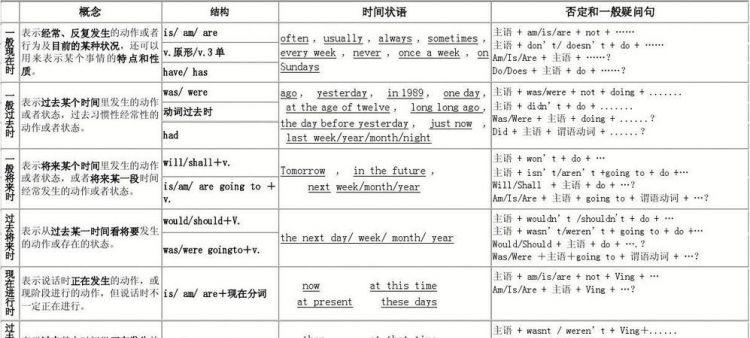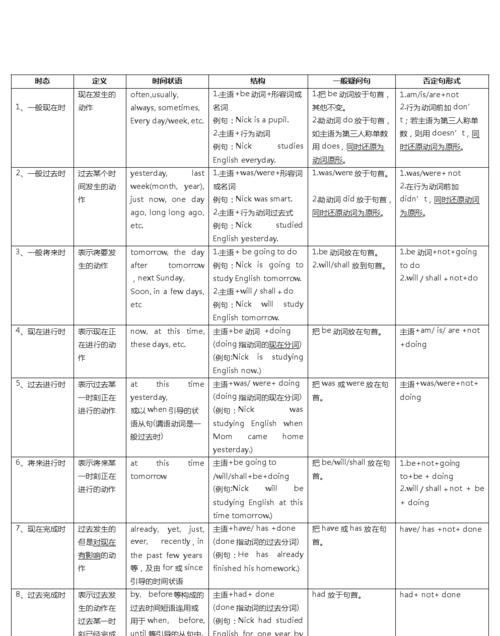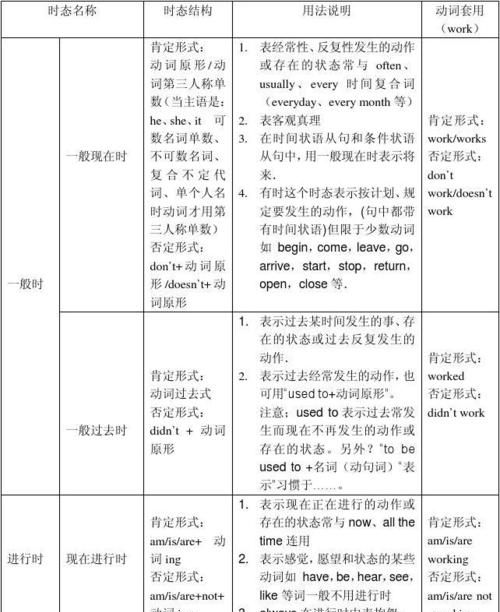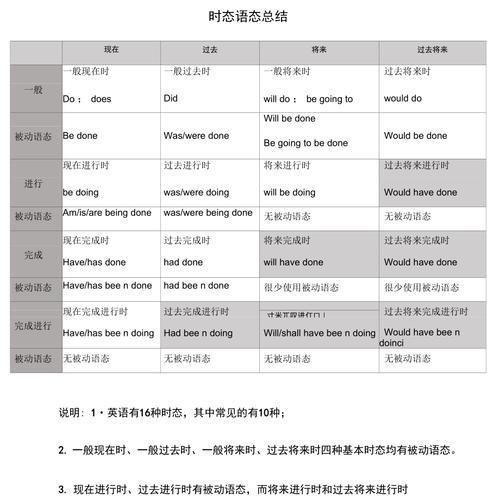本文目录

英语时态16种及例句
例句:1.The earth is smaller than the sun.[状态][真理性]
2.Tom gets up early every morning.[动作][经常性和习惯性]
3.Everybody knows him.[普遍性]
2.过去时:表示过去某一时间里发生的动作或状态.[叙事性的文章和故事里最常用的时态].
例句:1.Yesterday we went to the park.[动作]
2.The book was there ten minutes ago.[状态]
3.将来时:表示将来某一时间里发生的动作或状态.
例句:1.Tom will help you tomorrow.[动作]
2.We shall be here in time next time.[状态]
4.过去将来时:表示从过去某一时间看将在以后某一时间里发生的动作或状态.[注意不要跟现在联系起来]
例句:1.Ten years ago,Mary said she would finish the work in a few days.[动作]
2.Yesterday he thought you would be a good player after five years.[状态]
5.现在完成时:表示在现在之前就已经完成的动作或状态[要特别注意不包括现在].
例句:1.We have done our homework.[动作]
2.He has been a doctor now..[状态]
6.过去完成时:表示在过去某时之前就已经完成的动作或状态.
例句:1.Three days ago he had already finished his homework.[动作]
2.When he was a boy,he had already been a head of the boys.[状态]
7.将来完成时:表示在将来某时之前将完成的动作或状态.
例句:1.Tomorrow morning,I will have cleaned the windows.[动作]
2.Next Sunday,he will have been a new doctor.[状态]
8.过去将来完成时:表示在过去某一时间之前本该完成的动作或状态.[一般用于虚拟语态]
例句:1.If he had worked hard enough,he would have built a new house.[动作] [实际情况是因为他不够努力,所以新房子连影子都没有]
2.If he were alive,he would have been a doctor now..[状态][实际情况是他已经去世,所以永远成不了医生]
9.现在进行时:在现在之前开始,以后还要延续一段时间的动作.[要注意只有延续性动词可以用进行时].
例句:Tom is reading a book.
10.过去进行时:在过去某时之前开始,以后还要延续一段时间的动作.[要注意只有延续性动词可以用进行时].
例句:The dog was eating a bone.
11.将来进行时:在将来某时之前开始,以后还要延续一段时间的动作.[要注意只有延续性动词可以用进行时].
例句:At ten tomorrow morning,I will be writing the letter for you.
12.过去将来进行时:从过去某时来看将再以后某时之前开始,以后还要延续一段时间的动作.[要注意只有延续性动词可以用进行时].
例句:Jack told me that he would be working hard the next year.
13.现在完成进行时:在现在之前就已经完成并且还要延续下去的动作.[较少用]
例句:Tom has been reading this book forover ten hours.
14.过去完成进行时:在过去某时之前就已经完成并且还要延续下去的动作.{很少用}
例句:The workers had been building the railway then.
15.将来完成进行时:在将来某时之前就已经完成并且还要延续下去的动作.{很少用}
例句:They will have been making their efforts after that time.
16.过去将来完成进行时:在过去某时之前看来将来某时应该已经完成并且还要延续下去的动作.{很少用}
例句:We thought they would have been doing physical training till then.

英语的九大时态表格
现以“I”为主语,“do”为动词,把这十二种时态以实例表达如下:(例序即为时态的次序)
1.I do it every day.
(我每天做这样的事。)一般现在时 动词用原型
2.I did it yesterday.
(昨天我做了这件事。)一般过去时 动词用过去式
3.I shall/will do it tomorrow.
(明天我要做这件事。)一般将来时 shall/will + 动词原形
4.I am doing it now.
(现在我正在做这件事。)现在进行时 be动词 + 动词现在分词
5.I was doing it at that time.
(当时我正在做这件事。)过去进行时 be动词的过去式 + 动词现在分词
6.I shall/will be doing it at 9:00 tomorrow morning.
(明天早晨九时我会正在做这件事。)将来进行时 shall/will + be + 动词现在分词
7.I have done it already.
(我已把这件事做好了。)现在完成时 have/has + 动词过去分词
8.I had done it before I went home yesterday.
(昨天我在回家之前就把那件工作做完了。)过去完成时 had + 动词过去分词
9.I shall/will have done it before you come back tomorrow.
(明天在我回来之前我会把这件工作做好。)将来完成时 shall/will + have + 动词过去分词
10.I have been doing it for two days.
(这件工作我已做了两天了。——说话时工作尚未做完,所以还得继续做。)现在完成进行时 have/has been + 动词现在分词
11.I had been doing the work for two hours when the teacher came.
(老师来时那件工作我已做了两小时了。——当时工作尚未完成,所以老师来了我还继续在做。)过去完成进行时 had been + 动词现在分词
12.I shall/will have been doing it for an hour when you come to see me at 9:00 tomorrow morning.
(明天早上九时你来看我时,我会在做那件工作做了一小时。——当然尚未能做完,还得继续做下去。)将来完成进行时 shall/will + have been + 动词现在分词

八种英语时态的主动语态和被动语态
一、一般时态
1、一般现在时
(1)一般现在时表示没有时限的持久存在的动作或状态或现阶段反复发生的动作或状态,常和副词usually,often,always sometimes, regularly,near,occasionally,every year, every week等连用。例如:
1)The moon moves round the earth..
2)Mr. Smith travels to work by bus every day.
(2)在由after,until,before,once,when,even if,in case,as long as,as soon as,the moment以及if,unless等引导的时间状语从句或条件状语从句中,通常用一般现在时代替将来时。例如:
1)I will tell him the news as soon as I see him.
2)I will not go to countryside if it rains tomorrow.
(3)某些表示起始的动词,可用一般现在时表示按规定、计划或安排要发生的动作,这类动词有:be,go,come,start,depart,arrive,begin,leave等。例如:
1)The plane leaves at three sharp.
2)The new teachers arrive tomorrow.
(4)在由why,what,where,whoever,who,that,as等引导的从句中,也常用一般现在时代替将来时。例如:
1)Free tickets will be given to whoever comes first.
2)You’ll probably be in the same train as I am tomorrow.
2.一般过去时
(1)表示过去某一特定时间所发生的、可完成的动作或状态,常与表示确切过去时间的词、短语或从句连用。例如:
We went to the pictures last night and saw a very interesting film.
(2)表示过去习惯性动作。例如:
1)He always went to class last.
2)I used to do my homework in the library.
(注意与be used to doing短语的区别)

以上就是关于十二种时态及例句 ,英语的九大时态是那些用法还有例句的全部内容,以及十二种时态及例句 的相关内容,希望能够帮到您。

